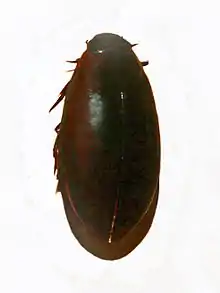Megadytes
Megadytes is a genus of diving beetles in the family Dytiscidae. They are found in slow-moving or static freshwater habitats throughout most of the Neotropics, ranging from Florida and Mexico, through the West Indies and Central America, to South America as far south as central Argentina.[1] The adult beetles measure 1.65–4.75 cm (0.6–1.9 in) long depending on the exact species and the largest is also the largest in the family (together with certain Dytiscus).[1][2]
| Megadytes | |
|---|---|
 | |
| Megadytes glaucus | |
| Scientific classification | |
| Kingdom: | Animalia |
| Phylum: | Arthropoda |
| Class: | Insecta |
| Order: | Coleoptera |
| Family: | Dytiscidae |
| Tribe: | Cybistrini |
| Genus: | Megadytes Sharp, 1882 |
Species
Megadytes contains the following species:[3]
- Megadytes aubei (Wilke, 1920)
- Megadytes australis (Germain, 1854)
- Megadytes carcharias Griffini, 1895
- Megadytes ducalis Sharp, 1882
- Megadytes ecuadorius Zimmermann, 1919
- Megadytes fallax (Aubé, 1838)
- Megadytes flohri Sharp, 1882
- Megadytes fraternus Sharp, 1882
- Megadytes glaucus (Brullé, 1837)
- Megadytes gravidus Sharp, 1882
- Megadytes guayanensis (Wilke, 1920)
- Megadytes guignoti Mouchamps, 1957
- Megadytes laevigatus (Olivier, 1795)
- Megadytes latus (Fabricius, 1801)
- Megadytes lherminieri (Guérin-Méneville, 1829)
- Megadytes magnus Trémouilles & Bachmann, 1980
- Megadytes marginithorax (Perty, 1830)
- Megadytes nicoleti (Heer, 1862)
- Megadytes obesus Sharp, 1882
- Megadytes perplexus Sharp, 1882
- Megadytes robustus (Aubé, 1838)
- Megadytes steinheili (Wehncke, 1876)
References
- Miller, K.B.; J. Bergsten (2016). Diving Beetles of the World: Systematics and Biology of the Dytiscidae. pp. 107–108. ISBN 978-1-4214-2054-7.
- G.N. Foster; D.T. Bilton (2014). "The Conservation of Predaceous Diving Beetles: Knowns, Unknowns and Anecdotes". In D.A. Yee (ed.). Ecology, Systematics, and the Natural History of Predaceous Diving Beetles (Coleoptera: Dytiscidae). pp. 437–462. ISBN 978-94-017-9109-0.
- Dytiscidae Species List Archived October 23, 2012, at the Wayback Machine at Joel Hallan's Biology Catalog. Texas A&M University. Retrieved on 7 May 2012.
This article is issued from Wikipedia. The text is licensed under Creative Commons - Attribution - Sharealike. Additional terms may apply for the media files.